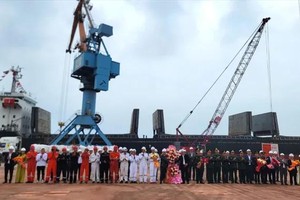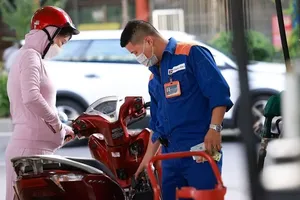Operating perfunctorily
At the delivery truck stop near the Go May - National Highway 1 intersection in Binh Tan District, many trucks have been parking here for 3-4 days, but there are still not enough goods for them to leave the stop. Mr. Nguyen Van, whose delivery trucks carry goods from Ho Chi Minh City to Central provinces, said he had about 200 delivery trucks, but only 22 vehicles were operating perfunctorily. For the return routes to HCMC, his trucks must make the most of their loads to carry all kinds of goods to cover costs partially. Meanwhile, costs have incurred a lot due to continuous hikes in petrol prices and the Covid-19 testing costs for drivers.
Mr. Tran Thanh My, the owner of My Tu Company, specializing in supplying building materials, said that most large construction projects have only operated moderately. Many projects even have not been deployed again, so many enterprises that specialize in providing construction materials and leveling have almost been standing still.
"In addition, the pandemic has not been over yet, and gasoline prices have continuously escalated, so businesses have been facing many difficulties in the past few months," said Mr. My.
Similarly, Nguyen Anh Tuan, owner of a company that transports agricultural products by container trucks on the North-South route, said that with a revenue of more than VND40 million per trip, the cost of oil is more than VND17 million, accounting for up to 36 percent. Freight rates should be raised by about 20 percent to balance revenue. However, the company is in a difficult position for signed contracts because customers hardly accept a change in freight charges at the moment.
Vice-Chairman of the Vietnam Automobile Transportation Association Ho Van Huong said that fuel costs accounted for 35-40 percent of transportation costs. Currently, the number of vehicles resumed operations is only 15 percent because of a decrease in the number of passengers. There are only a few passengers while gasoline prices climb. As a result, the more vehicles operate, the more losses they will suffer.
Accepting making up for losses
The recent sharp increase in gasoline prices has been directly affecting raw materials for the production of enterprises, such as packaging, transportation costs, and animal feed. Ms. Pham Thi Huan, General Director of Ba Huan Company, said that the average price of input raw materials has risen by about 30 percent compared to the previous one, whereas the selling prices of poultry eggs and other processed foods on the market remain unchanged.
The company does not increase its selling prices at this moment because the market has just undergone a prolonged social distancing, and the income of consumers has decreased, leading to weak purchasing power. To boost demand, the company even has to continuously launch promotions and discounts on poultry egg products, so price increases will not happen in the near future.
To keep the current price, the company must accept to reduce profits, even partially make up for losses. Therefore, in the long term, to support businesses, representatives of many companies proposed policies to stabilize market prices, as well as policies to create consumer demand, thereby creating leverage for businesses to promote consumption in large quantities, contributing to reducing losses, gradually recovering, and developing.
According to Dr. Dinh The Hien, an economic and financial expert, currently, commodity prices have surged because transportation activities connecting production with distribution have not actually recovered yet. However, the current increase in gasoline prices will also have a certain impact on the rise in commodity prices. In the long term, for the consumer goods prices not to hike sharply, Vietnam must promote the market economy, fight against monopolies or group interests so that there is no price manipulation.
























